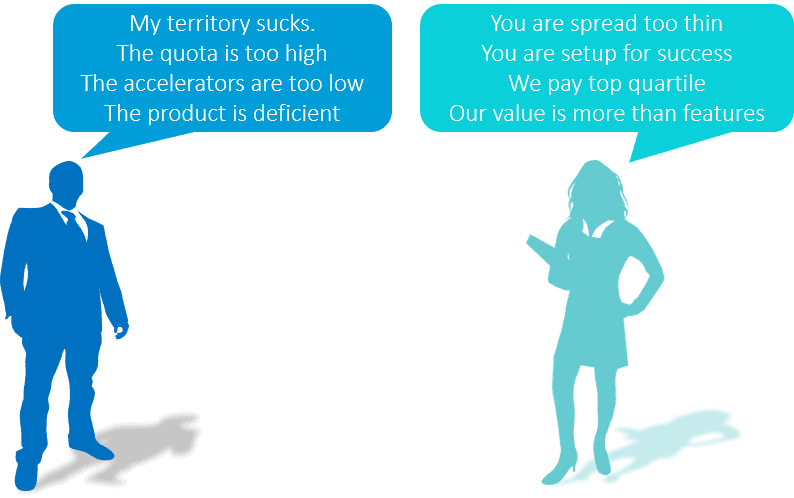In our front line manager bootcamp we spend a good chunk of time discussing how to successfully navigate the very challenging transition from being an individual contributor to joining the ranks of management. If you know someone who is about to go through this (or has done so recently) please share this article as a way to support them in the process.
The overarching guidance comes from our Sales Engineering leader, Stephen Morse, who used to have the following printed out at his desk:
My role is to help my team do better at their job than I ever could.
One of the hardest realizations for a new manager is that they are not there to be a ‘super-rep’, but in fact are there to build capacity in the team. If your new manager’s calendar is full of joint calls with early stage prospects, then it is likely they haven’t come to this realization yet. A symptom is that they appear disorganized, don’t have a handle on the high level metrics that matter and certainly are not engaged in a consistent coaching cadence (and they are likely frazzled from long hours as they seek to keep up).
The experience of the reps will either be one of dependence (They ask for management support or guidance on EVERYTHING) or disengagement – Capable reps will feel dis-empowered by the manager who insists on joining every call.

The antidote to this behavior is two-fold:
1) Realizing that the primary role of front line managers is that of ‘coach’, not ‘player’. It starts by evaluating the skill deficiencies in each team member and agreeing a structured coaching plan with monthly development themes.
2) Enforcing the use of call plans so that both manager and rep understand their respective roles, so that the manager ‘call take-over’ doesn’t occur.
We teach that there are 5 roles any manager must play – The key is to use each in the correct context and not to over use any of them:
Leadership role: Setting and defining the team vision
Management role: Practicing and implementing policies and procedures that mitigate organizational risk and drive rep productivity
Coaching role: Responsibility for the performance, production and engagement of reps.
Mentoring role: Advising based on personal and professional experience and expertise.
Training role: Sales managers must OWN training, if not deliver it.
The ‘super-rep’ issue is not the only challenge however… The change in mindset required is also a biggie. We see consistency in the behaviors that lead to poor outcomes.
The following behaviors are signs that a new manager is struggling to come to terms with their new set of responsibilities:
- Blames poor performance on circumstances: Poor leads, weak team member, seasonality, unusually humid weather….
- Does not take responsibility for influencing the team: Disgruntlement about a new comp plan/territories – “I know it sucks, but this is the hand we are dealt… I don’t like it either, but we just have to suck it up.”
- Waits to be told what to do: Lead flow is down and the manager states it as a fact without offering some solutions to bridge the gap
- Doesn’t challenge people to get creative: The competition has a killer feature and reps are getting hung up on it, rather than shifting the goal posts by elevating the importance of selection criteria that you can meet.
When coaching new managers I often explain to them that they must realize that they are now ‘Management’ and not ‘Union’ – the point being that their primary responsibility is the performance, production and engagement of their people. The biggest mindset switch is the primary question moving from, “What is best for me as a rep?’ vs “What is in the best interests of the company?” – This is tough, especially if last week a manager was in the trenches with the team and is now expected to have a new set of conversations:

At SaaSy we have some specific tactical advice on behaviors:
- If a conversation could not be had in front of the CEO, then you shouldn’t be in that conversation.
- There must be no ‘insider’ jokes – eg. Excluding newer members of the team who weren’t part of early company experience
- If your ‘outside of work’ life is not consistent with company culture or behavioral expectations, then keep that stuff to yourself!
- Managers must lead by example – “Do as I do”. Tardy arrival to meetings, not working out of the CRM and being unresponsive to emails are all behaviors that will get mimicked.
- All doubts and insecurities about the business are not to be shared with the team – My analog in the bootcamp is: “If you are driving 60Mph on a wet road, best to just focus on controlling the car; don’t turn to the kids in the back and say, “This road is really slick! I hope we don’t crash!”
If you have new managers, then we are here to help – They can join a cohort of peers at one of our SaaSy Sales Management workshops where we go deep on how to navigate these waters. www.saasysalesmanagement.com



